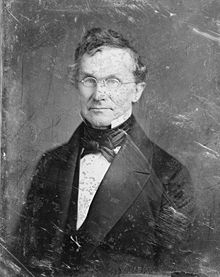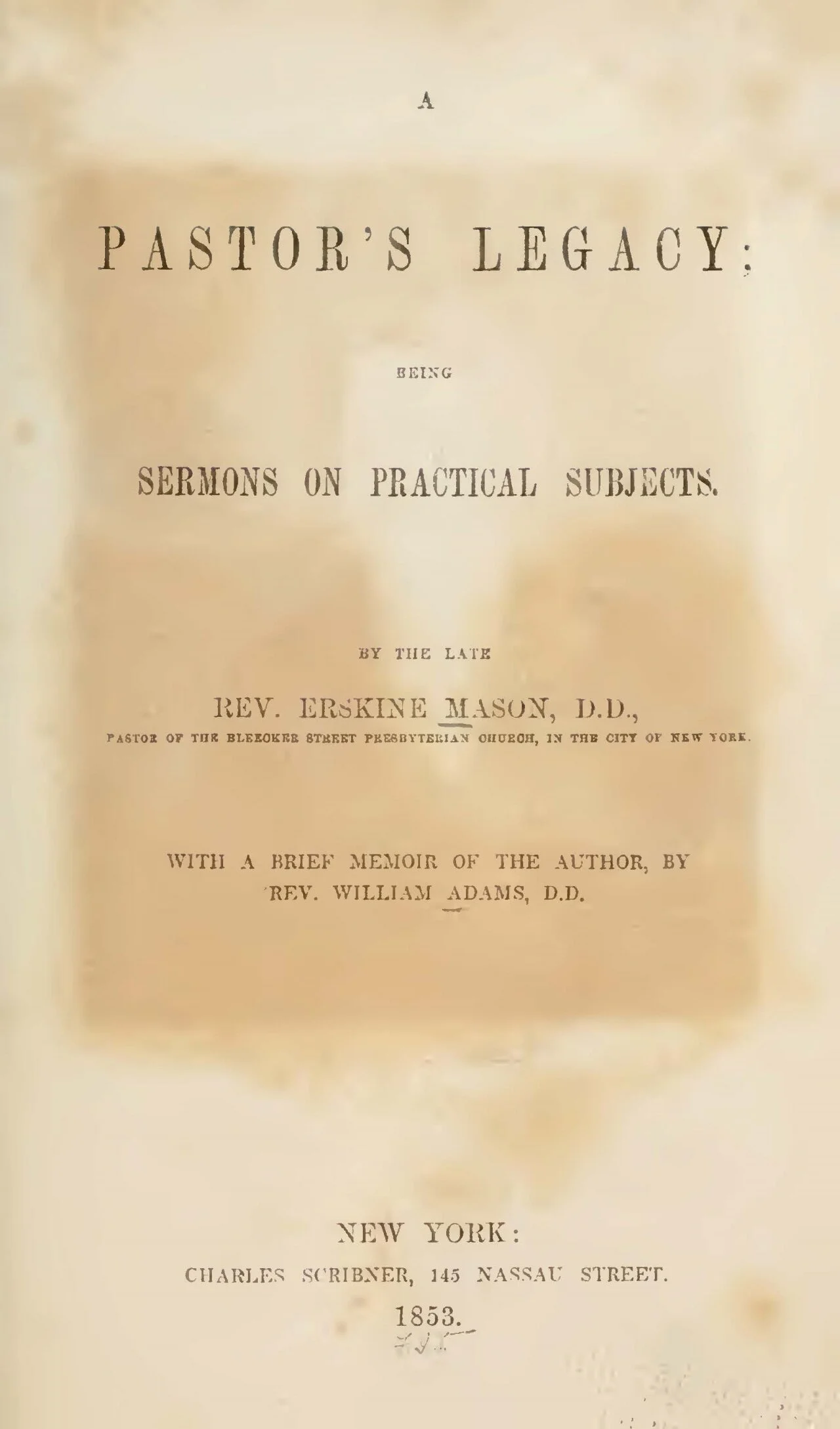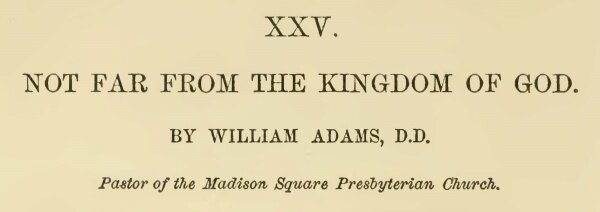William Adams served as pastor of the Madison Square Presbyterian Church from 1853 to 1873.
William Adams is buried at Mount Auburn Cemetery, Cambridge,, Massachusetts.
The History, Character, and Importance of the Received English Version of the Bible (1835)
On the Death of President Harrison (1841)
Christianity the End and Unity of All Sciences and Pursuits: An Address (1847)
Becoming All Things To All Men (1850)
Christianity and Civil Government: A Discourse (1851)
The Missionary’s Mother: A Funeral Sermon on the Death of Mrs. Joanna Lathrop (1851)
A Discourse on the Life and Services of Professor Moses Stuart (1852)
Memoir of Erskine Mason (1853)
Man, the Minister of God: A Sermon (1855)
The Three Gardens, Eden, Gethsemane, and Paradise; or Man's Ruin, Redemption, and Restoration (1856)
Not Far From the Kingdom of God (1858)
External Associations Connected With the Bible (1860)
Sermon on the Death of President Abraham Lincoln (1865)
Conversations of Jesus Christ With Representative Men (1868)
Thanksgiving: Memories of the Day, Helps to the Habit (1873)
William Adams, then pastor of Central Presbyterian Church in New York City, addresses the alumni of his alma mater, Yale University, to argue that Christianity is foundational to all knowledge and intellectual endeavors. He sums up his point in this manner: “[The cross of Christ] is the one fact which is central to all other facts; the one knowledge which is ultimate to all other departments of knowledge. We announce it here not merely as the Sabbath-day religion of the pulpit; but as a great intellectual truth before an university of scholars, that the true philosophia prima is the knowledge of Christ; that the only object which gives relationship, harmony, unity, connection, to all this world's affairs, is the grand purpose of God to diffuse a stable and substantial happiness over the world, through the all-pervading beneficence of Christianity, as the central power; and consequently, that our true interest and duty, in all the variety of our pursuits, is to devote ourselves to the service of our race, in seeking to make the world better.”
When Moses Stuart, the famous exegete and professor at Andover Seminary, passed into glory, a group of New York pastors and professors who had sat under Dr. Stuart at Andover asked William Adams to deliver this discourse in celebration of his ministry to the church and to them personally.
William Adams, then pastor of Madison Square Presbyterian Church in New York City, preached this sermon on Psalm 144:1 to the Foreign Missionary Society of New York and Brooklyn. In his address he examines an element of truth in Islam that has given this false religion its vital power - “a sentiment working in that conjunction only for evil—yet a sentiment full of force and from which the world has every thing to hope, and by which the Church has every thing to achieve when it is restored to its proper location in connection with the religion of Jesus Christ.” The sentiment Adams puts forth is this: “Verily there is a God, and man is his minister.” Adams explores the truth in Mohammed’s statement, and how Christians ought to appropriate it from a Biblical perspective as they seek to put sin to death and to bring the gospel to the lost in the work of missions.
The Three Gardens, Eden, Gethsemane, and Paradise; or Man's Ruin, Redemption, and Restoration (1856)
William Adams, three years after becoming the founding Pastor at Madison Square Presbyterian Church in New York City, discusses man’s ruin, redemption, and restoration through the lenses of the Gardens of Eden, Gethsemane, and Paradise. In his own words, “The present volume undertakes nothing more than to group together, in the simple and unpretending form of pastorly address—not of philosophic analysis—the principal facts which compose the Christian system. From whatever point of the circumference we start in the great circle of truth, each radius brings us to that focal center—the life and mediation of Jesus Christ.”
William Adams surveys the conversations of Jesus with Nicodemus, the rationalist; the woman of Samaria, the obtuse sensualist; the young ruler, the moralist; the intelligent scribe, not far from the kingdom of God; Zaccheus, a true convert; the centurion of Capernaum, the modest man of faith; Martha of Bethany, the mourner; Pilate, the vacillating man of the world; Mary Magdalene, love rewarded; and Peter, the restored penitent. In each of these conversations Adams is intent on identifying the general impression that Jesus made upon his interlocutor.
Thanksgiving: Memories of the Day, Helps to the Habit (1873)
William Adams, at the time the pastor of Madison Square Presbyterian Church in New York City, supplies his readers with pastoral meditations on the graces of contentment and gratitude - particularly fitting for that uniquely American holiday, Thanksgiving Day. With chapter titles like “Happy Mediocrity,” “The Blessedness of Tears,” “Christian Patriotism,” “Cheap Contentment,” and “American Nationality,” Adams seeks to help Christians (particularly those who live in America) learn the secret of contentment as laid out for us by the apostle Paul in Philippians 4:4-7.























